A staggering 71 per cent of the earth's surface is covered by oceans. NOAA's National Geophysical Data Centre estimates that there is approximately a total of 321,003,271 cubic miles of water.
With so much water covering our planet, we'll explore what is in our oceans.
Life
We know that there are millions of different sea life species in the ocean, many still undiscovered. There are also around 4,000 species of coral reef fish found across the globe — that's close to a quarter of all of the world's marine fish species—though be aware that a millilitre of ocean water contains close to 1 million bacteria and 10 million viruses.
Magnificent sights & amazing depths
The earth's deepest area of the ocean is the Mariana Trench. Located in the western Pacific Ocean and to the east of the Mariana Islands, the deepest point found here measures in at an estimated 11,000 metres — or 36,000 feet. The average depth of the Earth's oceans is also 3,720 metres — or 12,200 feet.
Interestingly, the earth's longest mountain exists in the ocean. Named the Mid-Oceanic Ridge, this mountain chain stretches for more than 56,000km across and covers parts of the Atlantic Ocean, the Indian Ocean and the Pacific Ocean. Meanwhile, Earth's highest mountain in the ocean is the Mauna Kea. Found off the coast of Hawaii, the mountain rises for 10,203 metres (33,474 feet) from the ocean floor, with 4,170 metres (13,680 feet) viewable above sea level.
The earth's largest biosphere is housed underwater. This is the Great Barrier Reef off the coast of Queensland, Australia — it measures around 2,600km and is so huge that it can be spotted from the Moon.
Near the Gulf of Mexico, the ocean floor is occupied with brine pools as well as underwater volcanoes which release mud and methane instead of lava. There are also underwater hot springs found across the earth's oceans, where water with temperatures of 650°F shoot out — that's hot enough to melt lead.
National Geographic states that only five per cent of the earth's oceans have been explored — that means that we have more detailed maps of Mars than we do of our own planet's ocean floor.
Finds
Interestingly, our oceans are home to more artefacts and relics of history than all of the world's museums together. There is almost 20 million tons of gold within the earth's oceans too — if all which was suspended was mined, there would be enough to give each person on the planet around 9 pounds of gold. Up to $60 billion in sunken treasure is housed on the floors of Earth's oceans.
It's estimated by scientists that there could be roughly 50 quadrillion tons of solids dissolved in our oceans — calcium salts, magnesium salts, potassium salts, and sodium salts make up the bulk of this huge figure.
Sadly, around 14 billion pounds of rubbish is dumped into our oceans annually, with the largest pollution being plastic.
Trade & communication
90 per cent of international trade between countries is done by ships, with over half of our communications being conducted through underwater cables — subsea technologies such as flow assurance included.



















